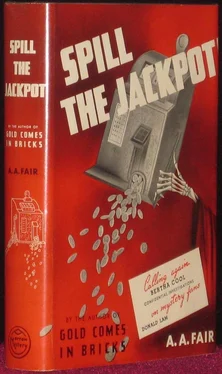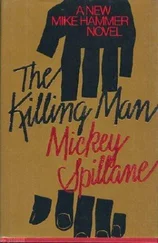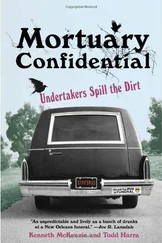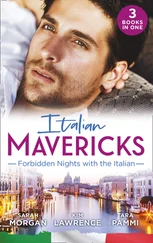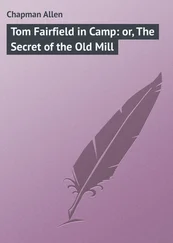“The letter.”
“You promise you won’t—”
“Hurry up,” I said. “You haven’t got all night. Neither have I. Let’s see it.”
She opened her purse, took out an envelope, and handed it to me.
I put it in my pocket.
“No, no, you mustn’t do that. I’ll need the letter. Pug will ask me about it as soon as I get back. He’ll want to burn it.”
“I’ll have to go where I can read it and study it for a clue.”
“Donald, you can’t. You’ve got to just glance at it. I can tell you what’s in it. I— Oh, my God!”
I looked up, following the direction of her startled eyes.
Pug was standing on the corner of the main thoroughfare, looking up and down the street.
She grabbed my arm. “Quick. Get back here—” Pug turned, looked down the side street, saw us, took a dubious step forward as though trying to see better, and then came rapidly toward us.
“What will we do?” she asked. “You run. I’ll stick it out. Run fast around the corner, and I’ll delay things until— No, no, you can’t. Donald, he’s dangerous. He’s half crazy. He—”
I held her arm as I walked toward him.
I couldn’t see his face clearly. The hatbrim shaded the expression in his eyes. The light on the side street was dim. A car swung around the corner behind us. Its lights illuminated his face in a harsh glare of white light. The features were hard with hatred.
Helen Framley saw that face and pulled back at my arm, twisting me half around.
Pug didn’t say anything. His eyes were on my face. He reached out with his right hand, caught the girl by the collar of her jacket, and sent her spinning across the sidewalk.
I swung for his jaw.
I don’t know whether it was the poor light or whether he was too mad to see what I was doing, or sufficiently disdainful not to care. He didn’t try to block or dodge. My blow caught him on the chin. Unconsciously I’d remembered something of what Louie had told me about throwing my body muscles into a blow. I hit him so hard I thought my arm was broken.
It didn’t even jar his head back on his neck. It was as though I’d swung on the side of a concrete building. He said, “You double-crossing, two-timing stool pigeon—” His fist crashed into my jaw.
It was his left. It jarred me back on my heels. I knew his right would be coming across. I tried to get out of the way and stumbled, off balance, which threw my shoulder up. His right caught me on my shoulder and sent me out across the sidewalk into the gutter.
The car swerved. Headlights blazed at us. I thought the machine was going to run over me. I got up and Pug was coming toward me, not hastily, just with a quiet deadliness of purpose.
The car was stopped now. I heard a door slam, steps behind me. A voice said, “No, you don’t.”
Pug didn’t pay any attention to the voice. His eyes were only on me.
I thought I saw an opening and lashed out.
The big bulk of a body moved past me. I heard the thudding impact of a fist against flesh, and then Pug and a big man were whirling around in a tangled circle. The big man’s shoulder hit against me and flung me off to one side. Before I could get back, Pug had broken free. I saw his shoulders-weave, then the broad back and huge shoulders of the big man interposed themselves between me and Pug.
Something sounded like a fast ball thudding into a catcher’s glove. The big man came back hard, and took me down with him.
I heard people shouting. A woman screamed. There were steps — running toward us.
Someone bent over us. I squirmed to get free. The automobile lights showed Pug’s face, still hard with cold hatred, bending over. He jerked the inert body of the big man to one side as though it had no weight. He leaned over me. His left hand grabbed my shirt and necktie. He started to lift me.
Someone was back of him. I saw a club making a glittering half circle, and heard the thud on the back of Pug’s skull. The hand that was holding my shirt loosened its grip. I fell back against the bumper of the car.
By the time I straightened, there was a swirl of activity back in the crowd. I heard the sound of grunting breaths, the sound of another blow, then feet running, this time away from me.
The big man who had gone down and taken me with him struggled to his knees. His right hand swung back to his hip. I saw blued steel glittering in the light reflected by the automobile headlights. I caught the man’s profile as he raised the gun and turned his head. It was Lieutenant Kleinsmidt.
A man pushed through the little crowd. “Everything all right, Bill?” he asked.
Kleinsmidt said thickly, “Where is he?”
“He got away. I gave him a full swing with the club, but it didn’t stop him.”
Kleinsmidt struggled to his feet.
I was tangled up with the bumper of the car. I had to get a hand on it to pull myself up. Kleinsmidt grabbed me, spun me around, and said, “Oh!”
I said, “I’m sorry, Lieutenant,” and added with a flash of inspiration, “I tried to hold him for you.”
“You sure have guts,” he told me, and rubbed his jaw.
“What you want him for, Bill?” the man with the club asked.
“Slot-machine racket,” Kleinsmidt said, and then added as an afterthought, “Resisting an officer.”
“Well, we can get him.”
Kleinsmidt said to me, “Know where he lives?”
I brushed dirt off my clothes. “No.”
“Which way did he go?” Kleinsmidt asked.
Half a dozen people were eager to volunteer information. Kleinsmidt looked back at the car for a moment as though hesitating, then started out on foot, and took the other man with him. The little crowd went streaming along behind to see the fun.
I limped away into the darkness. Seven o’clock, and Bertha would be waiting.
I went over to the Apache Hotel, drifted into the lobby, found a seat, took the letter Helen Framley had given me from my pocket, and looked it over carefully.
It was written on a good quality stationery, but the sheet was an odd size. The top edge held hale irregularities so small as to be almost imperceptible unless you looked for them carefully. The paper spilled a faint trace of scent. I couldn’t tell what kind it was. There was a certain suggestion of cramped angularity about the handwriting.
The letter read:
Dear Helen Framley:
I’m grateful for your letter, but it’s no use. I can’t go through with the marriage now. It wouldn’t be fair to him. The thing you suggest is unthinkable. I’m getting out of the picture. Good-by.
Corla Burke
I studied the envelope in which the letter had been enclosed. It was a stamped, air-mail envelope. The General Delivery address on the outside was in that same handwriting as the body of the letter. Someone at the post office had crossed this out and written in the street and number of Helen’s apartment.
I put the letter back in the envelope, put it in my pocket, then thought better of it. I took the letter back out of the envelope, put it in my inside coat pocket, put the envelope in the outside pocket on my coat, and walked back to the Sal Sagev Hotel.
Bertha said, “Donald, what the hell have you been doing?”
“Working.”
“You’ve been fighting again. You’re a mess. Here take this clothesbrush. No, tell me first, what did you find?”
“Clues.”
“Well, don’t be so damned reticent. Tell me what happened.”
“I heard this girl was a slot-machine addict. I would either have had to stick around until three or four o’clock in the morning waiting for her to come in, or go out and find her around the slot machines.”
“Well, you don’t need to play slot machines just because you’re waiting.”
Читать дальше
